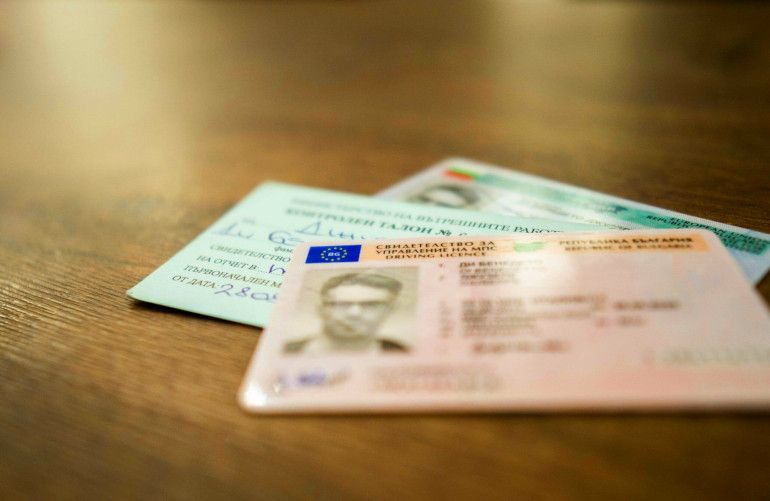How to get a driver’s license in Bulgaria if you are a foreigner
In partnership with First Driving School for Foreigners, edited by Scott Green and Andrea Vushkova, photos by Anastasiia Dehtiarova and Unsplash
Published 5 March 2020, updated 06 January 2023
Driving is a great way for you to see Bulgaria's beautiful nature, visit your friends in other cities, and even travel abroad. With some eco-friendly options like Spark, it can also become an environmentally friendly activity. What if you don’t have a driver’s license or if Bulgaria requires you to get a new one? This article is here to help you. And when you do get your license, check our article on buying a second-hand car in Bulgaria. If you are looking for more specific information on the process of getting your driving license, check out our next article.
Requirements for getting/changing to a Bulgarian license.
Bulgarian ID Card. You need a Personal Foreigner Number in the form of a Bulgarian ID card, the type of residency you have is not important. It is mandatory for both EU and Non-EU citizens to have an ID card as without it you are not allowed to be officially registered in a driving school or take the necessary exams. You have the right to start a driving course for any category (cars, trucks, motorcycles) once you get the residency permit. However, the earliest moment you can apply for the physical driver’s license in the Traffic police office is six months after you get the residency permit.
Proof of sufficient education. You need an original high school certificate that proves you have completed at least 8th grade (if you have completed it before 26 September 2017) or at least 10th grade (in case you have completed 8th grade after 26 September 2017), or the high school diploma, or a university degree which need to be recognized by the Ministry of Education in Bulgaria.
All the original education certificates must contain the academic reference (transcript) with all the school subjects and grades. High school certificates must be Apostilled unless issued by Bulgaria, or by another country that has a bilateral agreement with Bulgaria to recognize official documents. The institution authorized to give you the Apostille is the Ministry of Foreign Affairs in the country that issued the certificate. The certificates must be translated into Bulgarian and notarized.
First Driving School for Foreigners can do the entire paper procedure in relation to the education recognition for you. The school office sends your documents for translation, submits them for recognition online, and keeps you informed about all the steps. What you need to do is send them scanned copies of the certificates and a copy of your Bulgarian residency permit to [email protected] and/or [email protected].

Recognition of Education.
If you wish to get your high school diploma recognized, it must be from the 8th up to the 12th grade. The agency that does the recognition is the Regional Inspectorate of Education.
You must submit the following documents to the Regional Inspectorate of education:
-original school certificate and a copy;
-translation of the school certificate and a copy;
-a copy of the Bulgarian residence card;
-application form;
- in case your name in the high school certificate and in the Bulgarian residency permit is different, you need to present the marriage certificate translated in Bulgarian and notarized (no need to be Apostilled in your country);
-you pay a 35 BGN fee.
In case the school applies online, you transfer 35 BGN and send them a copy of the proof of payment.
In case you apply in person, you pay 35 BGN by card on the spot.
Bank details of the Inspectorate of education:
Bank: UBB
IBAN: BG57UBBS80023106075808
BIC: UBBSBGSF
Address: Sofia, Antim 1st street, #17
Reason for the payment: Education recognition for a driving license
It takes a month to get approval, and only this approval gives you the right to be officially registered in the First Driving School for Foreigners. A member of their team can assist you in case you prefer to submit the documents in person. There are multiple countries released from the obligation to Apostille certificates from secondary schools. If the country where you have studied is in the list below, there is no need to get an Apostille. The original school certificate, translated in Bulgarian and legalized, is enough to apply for recognition in the Agency of Education.
Albania, Algeria, Armenia, Austria, Azerbaijan, Belarus, Bosnia and Herzegovina, China, Croatia, Cuba, Cyprus, Czech Republic, France, Georgia, Greece, Hungary, Italy, Kuwait, Lebanon, Libya, Montenegro, North Macedonia, Poland, Romania, Russian Federation, Serbia, Slovakia, Slovenia, South Korea, Spain, Syria, Ukraine, Uzbekistan, Vietnam, Yemen.
In case you want to use your university degree as your proof of sufficient education, your documents must be submitted to NACID for recognition. The recognition process is free but it takes at least two months to get the certificate. The driving school team checks according to the country where you have graduated, what documents you need to prepare, if an Apostille is mandatory, etc.
Documents you need:
- The original university degree together with the academic reference, containing subject and grades (with or without apostille, depending on the country);
- Translation in Bulgarian (with or without notarization, depending on the country);
- The Bulgarian residency permit;
- In case your names in the university degree are different than the names in your residence permit, you need the marriage certificate translated in Bulgarian and notarized.
You can apply online or in person. In both cases the driving school will assist you because from their experience it is likely that you will face difficulties, the employees in the agencies hardly speak English, and some application forms should be filled in Bulgarian.
Recognition of higher education acquired at foreign higher educational institutions:
Category One.
My diploma does not need legalization and certification - it is issued in a country- party to the Lisbon Recognition Convention, or in a member-state of the European Union, Iceland, Liechtenstein, Norway, or Switzerland.
Countries in this category: Albania, Andorra, Armenia, Australia, Austria, Azerbaijan, Belarus, Belgium, Bosnia and Herzegovina, Canada, Croatia, Cyprus, Czech Republic, Denmark, Estonia, Finland, France, Georgia, Germany, Greece, Hungary, Iceland, Ireland, Israel, Italy, Kazakhstan, Latvia, Liechtenstein, Lithuania, Luxembourg, Malta, Montenegro, New Zealand, North Macedonia, Norway, Poland, Portugal, Kyrgyzstan, Moldova, Romania, Russian Federation, San Marino, Serbia, Slovak Republic, Slovenia, Spain, Sweden, Switzerland, Tajikistan, The Netherlands, Turkey, Ukraine, United Kingdom, and the USA.
The diploma and the diploma supplement, with the exception of the European diploma supplement, must be accompanied by a translation into Bulgarian by a so-called "sworn translator" (a person who has a contract for translations with the Ministry of Foreign Affairs pursuant to Article 2a (2) of the Regulations on Legalization, Certification and Translation of Documents and Other Documents, adopted by Decree No 184 of the Council of Ministers of 1958 (promulgated, SG No. 73/1958, amended and supplemented, No 10 of 1964, No 77 of 1976, No 96 of 1982, No 77 of 1983 and No. 103 of 1990). It is not necessary for the signature of the translator to be certified by the Ministry of Foreign Affairs.
Category Two.
My diploma is issued in a country outside category one, with which Bulgaria has a bilateral agreement for legal assistance (so-called consular certification).
List of countries in this category: Algeria, China, Cuba, Democratic People's Republic Of Korea, Kuwait, Lebanon, Libya, Mongolia, Syria, Uzbekistan, Vietnam, and Yemen.
For the countries with which Bulgaria has signed bilateral legal assistance agreements and in which there are provisions for exempting documents from Apostille legalization, the issued documents should bear a stamp of the institution, authorized to do so in the bilateral agreement. In this case, the necessary documents (diploma for higher education and diploma supplement) need only translation into Bulgarian and certification of the translation by the Bulgarian diplomatic or consular representation in this country, or by the Ministry of Foreign Affairs of the Republic of Bulgaria.
Category Three.
My diploma is issued in a country outside Categories one and two, which has ratified the Hague Convention (Apostille).
List of countries in this category: Antigua and Barbuda, Argentina, Bahamas, Bahrain, Barbados, Belize, Botswana, Brazil, Brunei, Burundi, Cabo Verde/Cape Verde, Chile, Cook Islands, Colombia, Costa Rica, Dominica, Dominican Republic, Ecuador, El Salvador, Eswatini, Fiji, Grenada, Guatemala, Guyana, Honduras, Hong Kong, India, Japan, Kosovo, Lesotho, Liberia, Macao, Malawi, Marshall Islands, Mauritius, Mexico, Monaco, Mongolia, Morocco, Namibia, Nicaragua, Niue, Oman, Panama, Paraguay, Peru, Philippines, South Africa, Saint Kitts and Nevis, Saint Lucia, Saint Vincent and Grenadines, Samoa, Sao Tome and Principe, Seychelles, South Korea, Suriname, Tonga, Trinidad and Tobago, Uruguay, Vanuatu, and Venezuela.
Information about the institutions, authorized to issue apostille in each country can be found here.
The documents (higher education diploma and diploma supplement) should be certified with an Apostille in the country where they were issued. There is no need for any other certifications in the home country. The certified documents must be accompanied by a legalized translation in Bulgarian, i.e. the translator’s signature must be certified by the Bulgarian diplomatic or consular representation in that country or by the Ministry of Foreign Affairs of the Republic of Bulgaria.
Category Four.
My diploma is issued in a country that is not in any of the above categories (legalization under the general order.) In this case, the documents are certified (legalized) by general order. The general order for legalization in different countries may vary depending on the structure of the official authorities at the location. In general, the sequence of certification is as follows:
1. The diploma and the diploma supplement are certified by the ministry, agency, or authority responsible for higher education in the country concerned (certification of the signature and official function of the rector of the university who has signed the diploma).
2. Certification by the Consular Section of the Ministry of Foreign Affairs of the issuing State (certification of the signature and official function of the previous certifying authority).
3. The Ministry of Foreign Affairs of the foreign state should be certified by the Bulgarian diplomatic or consular representation in that State (certification of the signature and official function of the previous certifying authority).
If there is no Bulgarian embassy/consulate in the issuing State, the stamp of the Ministry of Foreign Affairs should be certified/legalized by the embassy of that country in Bulgaria. The signature and certification of the Embassy Consular Office must be certified by the Bulgarian Ministry of Foreign Affairs. Further information can be found on the website of the Ministry of Foreign Affairs.
In our next article, we go into more detail about what else is required and how the First Driving School for Foreigners can assist you with the process.
This article was created in partnership with First Driving School for Foreigners because they have proven to be an expert in their field, they are able to assist you throughout the entire process of getting your Bulgarian driver’s license. Please note though, since regulations and procedures can evolve over time, we ask you to not consider the contents of this page as coming from an official source. As our goal is to provide our community with the most accurate information, if you find some inaccuracy or any outdated details, please let us know at [email protected], possibly with the links to correct official resources, so that we can verify and update the publication. Thank you.
